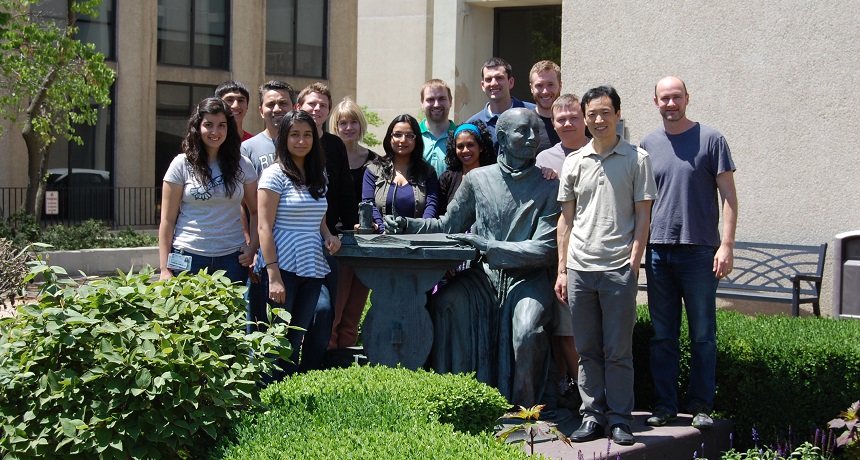High school students fill university lab with energy
Summer high-school researchers bring zest to college lab

The Robia lab. From left: high school students Berenis Calleros, Aimee Bueno, lab member Surtaj Iram, high school student Juan Orozco, lab members Chris Stefonowicz, Olga Raguimova, Neha Abrol, Taylor Zak, Vidhya Sivakumaran, Ryan Himes, Dan Blackwell, Nikolai Smolin, Zhanjia Hou and lab leader Seth Robia.
O. Raguimova
High school students might find the idea of joining a college research lab intimidating. They will be working with scientists who have impressive-sounding degrees and many years of experience. Students might think they would have little to contribute. But they’d be wrong. As a lab at Loyola University Chicago shows, summer students don’t have to be chemistry whiz-kids to make a difference. What they need most is energy, enthusiasm and a willingness to learn.
Seth Robia began taking high school students into his lab four years ago. As a physiologist, he studies how bodies function. In his lab at Loyola, he studies how proteins — long chemical chains that serve as building blocks of most cells — change their shape. In the heart, special proteins pump charged atoms and molecules, called ions, in and out of cells. His lab is probing how these proteins change shape as they work, and what that shape change means for the proteins’ function.
“I like getting students interested in science,” Robia says. “It warms my heart when a student says ‘I was thinking of becoming something else, but I want to go into science instead.’” And his lab members learn plenty from teaching high school students each summer. But what they hadn’t initially anticipated was how much fun the teens add to the lab. “They have so much energy,” Robia says. “We get together once a week to play soccer, and it’s fun for us when they come.”
This year, Robia hosted three high-school summer students. Juan Orozco, 17, met Robia at his church. The teen, who graduated from J. Sterling Morton High School West in Berwyn, Ill., is now starting college at DePaul University in Chicago. Juan says he was always interested in science, and wanted a taste of research: “I wanted to see what it would be like to make a living out of my curiosity.” He worked with Taylor Zak, an M.D./Ph.D. student. He is studying medicine while also conducting research.
“The best thing is getting to see young people that remind you of yourself,” Zak says. He was impressed with Juan’s enthusiasm and hard work. The teen even had a few things to teach him. “I would frequently quiz Juan on difficult topics,” Zak recalls. “I once asked him if he knew of anything that was fluorescent, and he responded with scorpions. I didn’t know that.”
Aimee Bueno, 18, and Berenis Calleros, 17, came to Robia’s lab through the Loyola Biomedical Internship Program. This program is run by Elizabeth Kovacs. An immunologist, she studies how the body works to fend off disease. Kovacs works with Corazon Community Services, in Cicero, Ill., and J. Sterling Morton High School East, also in Cicero. Corazon, which seeks to improve the lives of families in the Cicero area, identifies high-school teens with good grades and leadership skills. Kovacs then works with Loyola scientists to place the teens into university labs.
For Aimee, who is starting college at the University of Illinois in Chicago, the best part of research is seeing science as it happens. This immediacy “doesn’t really hit you until you find out that your lab mates are working on groundbreaking discoveries right in front of you,” she says.
Her mentor, Vidhya Sivakumaran, is a postdoc, or researcher who is gaining additional skills after already having completed her doctorate. Sivakumaran says working with Aimee “reminded me how much I love teaching and working with young people.” But the researcher says the best thing about working with teens is their enthusiasm: “They are so energetic and eager to learn.”
Olga Raguimova, a graduate student in the lab, worked with Berenis, who is starting her senior year at Morton East. “I had many incredible mentors in my life,” Raguimova says. “One of my career goals is to be an amazing mentor to my students.” That’s why she was thrilled to work withthe teen.
“Scientists are easy to talk to,” Berenis now finds. “You’re not scared to ask questions, because it’s all about learning something new every day.” All she needed to bring was an open mind and a passion for science.
Follow Eureka! Lab on Twitter
Power Words
ion An atom or molecule with an electric charge due to the loss or gain of one or more electrons.
postdoctoral scholar (or post-doc) A research position for people who have just completed their doctorate in some field of study. It allows the individual to acquire new skills or pursue new lines of research on the road to a research career.
proteins Compounds made from one or more long chains of amino acids. Proteins are an essential part of all living organisms. They form the basis of living cells, muscle and tissues; they also do the work inside of cells. The hemoglobin in blood and the antibodies that attempt to fight infections are among the better known, stand-alone proteins. Medicines frequently work by latching onto proteins.